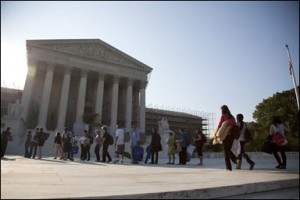Class actions back on U.S. Supreme Court’s radar
By: KIMBERLY ATKINS, BridgeTower Media Newswires//November 28, 2012//
Class actions back on U.S. Supreme Court’s radar
By: KIMBERLY ATKINS, BridgeTower Media Newswires//November 28, 2012//
There are plenty of big cases on the docket at the U.S. Supreme Court this term, dealing with issues ranging from search and seizure standards to affirmative action.
But the case that litigators will be watching most closely, although it may not grab as many headlines, considers a crucial question: Must plaintiffs seeking to certify a class action first prove that class-wide damages can be awarded, and if so, what evidence must they proffer?
In the wake of several Supreme Court rulings that have already drastically scaled back the types of class action claims plaintiffs can bring, lawyers are bracing for the potential impact of Comcast v. Behrend. Oral arguments in the case were heard on Nov. 5.
Plaintiffs’ attorneys fear an adverse ruling would make “class actions much more difficult to bring, much more expensive to bring, and would require many, many more experts to certify,” said Philip J. Gordon of the Gordon Law Group in Boston, an employment law firm that represents employees. “It would mean that millions of citizens will never get their day in court and never get the relief for the wrongs that are happening to them on a daily basis.”
But members of the defense bar say the justices have the opportunity to state directly what they have already hinted at in past cases: that evidence proffered by plaintiffs and their experts at the class certification stage must meet a standard similar or equal to that required at the merits stage.
“I think that this is an opportunity for the Supreme Court to articulate a standard,” said John B. Lewis, a partner in the Cleveland office of Baker & Hostetler, where he defends complex employment, civil rights and regulatory class actions.
 The case stems from an antitrust suit filed on behalf of cable subscribers alleging that Comcast violated the Sherman Act by engaging in schemes to eliminate competition in the Philadelphia market.
The case stems from an antitrust suit filed on behalf of cable subscribers alleging that Comcast violated the Sherman Act by engaging in schemes to eliminate competition in the Philadelphia market.
Comcast argued that class certification was improper because the plaintiffs’ expert did not provide a workable model to prove damages on a class-wide basis. But the 3rd Circuit disagreed. The Supreme Court granted certiorari in June.
The case gives the Court an opportunity to settle an issue that has left litigators guessing: Does the standard for admitting expert testimony established in the 1993 case Daubert v. Merrell Dow Pharmaceuticals, Inc. (509 U.S. 579) apply at the class certification stage?
In the Supreme Court’s 2011 ruling in Wal-Mart v. Dukes, Justice Antonin G. Scalia made the following statement in dicta: “The District Court concluded that Daubert did not apply to expert testimony at the certification stage of class-action proceedings. We doubt that is so.”
Most, but not all, lower courts have followed that dictum to varying degrees, leaving the state of the law unsettled.
Once the Supreme Court rules, it “will have implications for discovery, timing, costs and obviously strategy,” said Sean P. Wajert, a partner in the Philadelphia office of Shook, Hardy & Bacon and author of the Mass Tort Defense blog.
Legal News
- Former law enforcement praise state’s response brief in Steven Avery case
- Eric Toney announces re-election bid for Fond du Lac County District Attorney
- Former Wisconsin Democratic Rep. Peter Barca announces new bid for Congress
- Republicans file lawsuit challenging Evers’s partial vetoes to literacy bill
- More human remains believed those of missing woman wash up on Milwaukee Co. beach
- Vice President Harris returning to Wisconsin for third visit this year
- Wisconsin joins Feds, dozens of states to hold airlines accountable for bad behavior
- Trump ahead of Biden in new Marquette poll
- Bankruptcy court approves Milwaukee Marriott Downtown ‘business as usual’ motion
- New Crime Gun Intelligence Center to launch in Chicago
- Arrest warrant proposed for Minocqua Brewing owner who filed Lawsuit against Town of Minocqua
- Wisconsin Supreme Court justices question how much power Legislature should have
WLJ People
- Power 30 Personal Injury Attorneys – Russell Nicolet
- Power 30 Personal Injury Attorneys – Benjamin Nicolet
- Power 30 Personal Injury Attorneys – Dustin T. Woehl
- Power 30 Personal Injury Attorneys – Katherine Metzger
- Power 30 Personal Injury Attorneys – Joseph Ryan
- Power 30 Personal Injury Attorneys – James M. Ryan
- Power 30 Personal Injury Attorneys – Dana Wachs
- Power 30 Personal Injury Attorneys – Mark L. Thomsen
- Power 30 Personal Injury Attorneys – Matthew Lein
- Power 30 Personal Injury Attorneys – Jeffrey A. Pitman
- Power 30 Personal Injury Attorneys – William Pemberton
- Power 30 Personal Injury Attorneys – Howard S. Sicula











